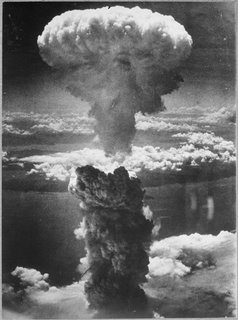Twenty kilotons for each taxicab in Anchorage
 ARMED WITH A SUPREME COURT ORDER, LIBERTARIANS DECLARE WAR ON ANCHORAGE'S “LIMITED ENTRY” TAXICAB PERMIT SYSTEM: A recent decision of the Alaska supreme court has ignited yet another bitter taxicab war in Anchorage. On December 22, 2006 the court ordered a public vote on an initiative that would repeal the current municipal system which limits issue of new taxicab permits in Anchorage. New permits have not been issued since 1994, thereby assuring operators of a lucrative market for existing permits which are worth more than $125,000 to private investors.
ARMED WITH A SUPREME COURT ORDER, LIBERTARIANS DECLARE WAR ON ANCHORAGE'S “LIMITED ENTRY” TAXICAB PERMIT SYSTEM: A recent decision of the Alaska supreme court has ignited yet another bitter taxicab war in Anchorage. On December 22, 2006 the court ordered a public vote on an initiative that would repeal the current municipal system which limits issue of new taxicab permits in Anchorage. New permits have not been issued since 1994, thereby assuring operators of a lucrative market for existing permits which are worth more than $125,000 to private investors.On the advice of then municipal attorney Bill Green, Municipal Clerk Greg Moyer in 2002 rejected initiative petitions bearing the signatures of thousands of Anchorage residents calling for a public vote on a new system that would allow issue of new permits upon safety compliance and payment of a small administrative fee to the municipality. If approved by the voters in the upcoming April 3, 2007 election, the measure could allow for issue of dozens of new cab permits but would also destroy the lucrative resale market for existing permits.
According to Greene, the initiative should not have gone to voters in 2002 because cab permits are "public assets" that cannot be appropriated directly by the people through an initiative. Greene also argued that if the initiative were approved, the municipality would have to reimburse the holders of existing permits for the lost value of their investments and therefore, the measure constituted an unconstitutional "appropriation" of public funds for that purpose. By a vote of 4-1, the court held cab permits were not "public assets" and the city erred by refusing to allow a public vote on the initiative in 2002 for that reason. The court declined to reach the second issue, however, as to whether implementation of the initiative would require payment of compensation holders of existing permits for private property "taken" by the regulatory scheme. The court found this issue legally debatable and not appropriately resolved before the election.
A motion for reconsideration filed on January 2, 2007 by the municipal attorney asks the court to decide the issue of whether the initiative would "take" private property thereby requiring compensation to permit holders. The municipality argues that this issue should be resolved before the election, so voters will know if the measure is fiscally neutral or one which will cost more than $20M in just compensation to permit holders if approved. As things stand now, the municipal clerk will be required to put the initiative on the April 3rd ballot unless otherwise directed by the court. With several other controversial issues headed to voters on the same ballot, including possible repeal of the city’s secondhand smoke ordinance, an "advisory" state vote on health benefits for same sex partners of state workers, and the election of six members of the Assembly, the election in April should indeed be interesting.

